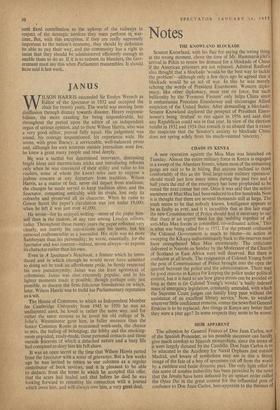JANUS
WILSON HARRIS succeeded Sir Evelyn Wrench as Editor of the Spectator in 1932 and occupied the chair for twenty years. The world was moving from disillusion through dismay towards disaster. Heavy responsi- bilities, the more exacting for being imponderable, lay throughout the period upon the editor of an independent organ of serious opinion, and to these Wilson Harris, who was a very good editor, proved fully equal. His judgement was sound, his courage unquestioned, his experience wide. He wrote, with great fluency, a serviceable, well-balanced prose and, although his own interests outside journalism were few, he knew a great many people and read deeply.
He was a tactful but determined innovator, distrusting bright ideas and meretricious tricks and introducing reforms only when he was convinced of their utility and value to his readers, some of whom (he knew) were sure to express a jealous concern at any departure from tradition. Wilson Harris, as a matter of fact, never did depart from tradition; the changes he made served to keep tradition alive, and the Spectator, competing amicably with its rivals, lost only its cobwebs and preserved all its character. When he came to Gower Street the paper's circulation was just under 19,000; when he left it was just over 41,000.
He wrote—for he enjoyed writing—more of the paper him- self than is the custom, at any rate among London editors, today. Throughout those twenty years the paper reflected very clearly, not merely his convictions and his tastes, but his personal craftsmanship as a journalist. His style was no more flamboyant than his personality; he wrote, essentially, for the Spectator and was content—indeed, strove always—to express its character rather than his own.
Even in A Spectator's Notebook, a feature which he intro- duced and in which (though he would never have admitted to doing so) he took an affectionate pride, he firmly respected his own pseudonymity; Janus was the least egotistical of columnists. Janus was also extremely popular, and in his lighter moments made it possible, though perhaps only just possible, to discern the firm, felicitous foundations on which, later, Wilson Harris was to build his Parliamentary reputation as a wit. • The House of Commons, to which as Independent Member for Cambridge University from 1945 to 1950 he was an undisputed asset, he loved in rather the same way, and for rather the same reasons as he loved his old college of St. John's. Westminster gave him, in fuller measure than the Senior Common Room at occasional week-ends, the chance to mix, the feeling of belonging; the lobby and the smoking- room prqvided, ready-made, those personal contacts and those outside interests of which a detached nature and a busy life had conspired to deny him his full share.
It was an open secret at the time that Wilson Harris parted from the Spectator with a sense of grievance. But a few weeks ago he was invited to return to our columns as a regular contributor of book reviews, and it is pleasant to be able to deduce, from the terms in which he accepted this offer, that the scars had healed and that before he died he was looking forward to resuming his connection with a journal which owes him, and will always owe him, a very great deal.


































 Previous page
Previous page